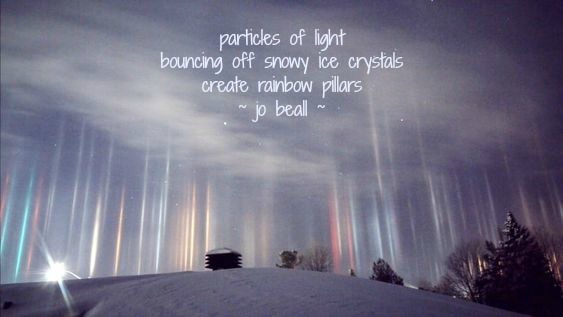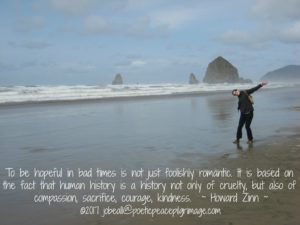I want to remind you that, fifty years ago, racial segregation here in the South was entrenched as tightly as was apartheid in South Africa. The national government, even with liberal presidents like Kennedy and Johnson in office, was looking the other way while black people were beaten and killed and denied the opportunity to vote. So black people in the South decided they had to do something by themselves. They boycotted and sat in and picketed and demonstrated, and were beaten and jailed, and some were killed, but their cries for freedom were soon heard all over the nation and around the world, and the President and Congress finally did what they had previously failed to do — enforce the 14th and 15th Amendments to the Constitution. Many people had said: The South will never change. But it did change. It changed because ordinary people organized and took risks and challenged the system and would not give up. That’s when democracy came alive.
I want to remind you also that when the war in Vietnam was going on, and young Americans were dying and coming home paralyzed, and our government was bombing the villages of Vietnam — bombing schools and hospitals and killing ordinary people in huge numbers — it looked hopeless to try to stop the war. But just as in the Southern movement, people began to protest and soon it caught on. It was a national movement. Soldiers were coming back and denouncing the war, and young people were refusing to join the military, and the war had to end.
The lesson of that history is that you must not despair, that if you are right, and you persist, things will change. The government may try to deceive the people, and the newspapers and television may do the same, but the truth has a way of coming out. The truth has a power greater than a hundred lies. I know you have practical things to do — to get jobs and get married and have children. You may become prosperous and be considered a success in the way our society defines success, by wealth and standing and prestige. But that is not enough for a good life.
Remember Tolstoy’s story, “The Death of Ivan Illych.” A man on his deathbed reflects on his life, how he has done everything right, obeyed the rules, become a judge, married, had children, and is looked upon as a success. Yet, in his last hours, he wonders why he feels a failure. After becoming a famous novelist, Tolstoy himself had decided that this was not enough, that he must speak out against the treatment of the Russian peasants, that he must write against war and militarism.
My hope is that whatever you do to make a good life for yourself — whether you become a teacher, or social worker, or business person, or lawyer, or poet, or scientist — you will devote part of your life to making this a better world for your children, for all children. My hope is that your generation will demand an end to war, that your generation will do something that has not yet been done in history and wipe out the national boundaries that separate us from other human beings on this earth.
Recently I saw a photo on the front page of the New York Times which I cannot get out of my mind. It showed ordinary Americans sitting on chairs on the southern border of Arizona, facing Mexico. They were holding guns and they were looking for Mexicans who might be trying to cross the border into the United States. This was horrifying to me — the realization that, in this twenty-first century of what we call “civilization,” we have carved up what we claim is one world into two hundred artificially created entities we call “nations” and are ready to kill anyone who crosses a boundary.Is not nationalism — that devotion to a flag, an anthem, a boundary, so fierce it leads to murder — one of the great evils of our time, along with racism, along with religious hatred? These ways of thinking, cultivated, nurtured, indoctrinated from childhood on, have been useful to those in power, deadly for those out of power.
Here in the United States, we are brought up to believe that our nation is different from others, an exception in the world, uniquely moral; that we expand into other lands in order to bring civilization, liberty, democracy. But if you know some history you know that’s not true. If you know some history, you know we massacred Indians on this continent, invaded Mexico, sent armies into Cuba, and the Philippines. We killed huge numbers of people, and we did not bring them democracy or liberty. We did not go into Vietnam to bring democracy; we did not invade Panama to stop the drug trade; we did not invade Afghanistan and Iraq to stop terrorism. Our aims were the aims of all the other empires of world history — more profit for corporations, more power for politicians.
The poets and artists among us seem to have a clearer understanding of the disease of nationalism. Perhaps the black poets especially are less enthralled with the virtues of American “liberty” and “democracy,” their people having enjoyed so little of it. The great African-American poet Langston Hughes addressed his country as follows:
You really haven’t been a virgin for so long.
It’s ludicrous to keep up the pretext
You’ve slept with all the big powers
In military uniforms,
And you’ve taken the sweet life
Of all the little brown fellows
Being one of the world’s big vampires,
Why don’t you come on out and say so
Like Japan, and England, and France,
And all the other nymphomaniacs of power.
I am a veteran of the Second World War. That was considered a “good war,” but I have come to the conclusion that war solves no fundamental problems and only leads to more wars. War poisons the minds of soldiers, leads them to kill and torture, and poisons the soul of the nation.
My hope is that your generation will demand that your children be brought up in a world without war. If we want a world in which the people of all countries are brothers and sisters, if the children all over the world are considered as our children, then war — in which children are always the greatest casualties — cannot be accepted as a way of solving problems.
I was on the faculty of Spelman College for seven years, from 1956 to 1963. It was a heartwarming time, because the friends we made in those years have remained our friends all these years. My wife Roslyn and I and our two children lived on campus. Sometimes when we went into town, white people would ask: How is it to be living in the black community? It was hard to explain. But we knew this — that in downtown Atlanta, we felt as if we were in alien territory, and when we came back to the Spelman campus, we felt that we were at home.
Those years at Spelman were the most exciting of my life, the most educational certainly. I learned more from my students than they learned from me. Those were the years of the great movement in the South against racial segregation, and I became involved in that in Atlanta, in Albany, Georgia, in Selma, Alabama, in Hattiesburg, Mississippi, and Greenwood and Itta Bena and Jackson. I learned something about democracy: that it does not come from the government, from on high, it comes from people getting together and struggling for justice. I learned about race. I learned something that any intelligent person realizes at a certain point — that race is a manufactured thing, an artificial thing, and while race does matter (as Cornel West has written), it only matters because certain people want it to matter, just as nationalism is something artificial. I learned that what really matters is that all of us — of whatever so-called race and so-called nationality — are human beings and should cherish one another.
I was lucky to be at Spelman at a time when I could watch a marvelous transformation in my students, who were so polite, so quiet, and then suddenly they were leaving the campus and going into town, and sitting in, and being arrested, and then coming out of jail full of fire and rebellion. You can read all about that in Harry Lefever’s book Undaunted by the Fight. One day Marian Wright (now Marian Wright Edelman), who was my student at Spelman, and was one of the first arrested in the Atlanta sit-ins, came to our house on campus to show us a petition she was about to put on the bulletin board of her dormitory. The heading on the petition epitomized the transformation taking place at Spelman College. Marian had written on top of the petition: “Young Ladies Who Can Picket, Please Sign Below.”
My hope is that you will not be content just to be successful in the way that our society measures success; that you will not obey the rules, when the rules are unjust; that you will act out the courage that I know is in you. There are wonderful people, black and white, who are models. I don’t mean African- Americans like Condoleezza Rice, or Colin Powell, or Clarence Thomas, who have become servants of the rich and powerful. I mean W.E.B. DuBois and Martin Luther King and Malcolm X and Marian Wright Edelman, and James Baldwin and Josephine Baker and good white folk, too, who defied the Establishment to work for peace and justice.
Another of my students at Spelman, Alice Walker, who, like Marian, has remained our friend all these years, came from a tenant farmer’s family in Eatonton, Georgia, and became a famous writer. In one of her first published poems, she wrote:
It is true–
I’ve always loved
the daring
ones
Like the black young
man
Who tried
to crash
All barriers
at once,
wanted to
swim
At a white
beach (in Alabama)
Nude.
I am not suggesting you go that far, but you can help to break down barriers, of race certainly, but also of nationalism; that you do what you can — you don’t have to do something heroic, just something, to join with millions of others who will just do something, because all of those somethings, at certain points in history, come together, and make the world better.
That marvelous African-American writer Zora Neale Hurston, who wouldn’t do what white people wanted her to do, who wouldn’t do what black people wanted her to do, who insisted on being herself, said that her mother advised her: Leap for the sun — you may not reach it, but at least you will get off the ground.
By being here today, you are already standing on your toes, ready to leap. My hope for you is a good life.

